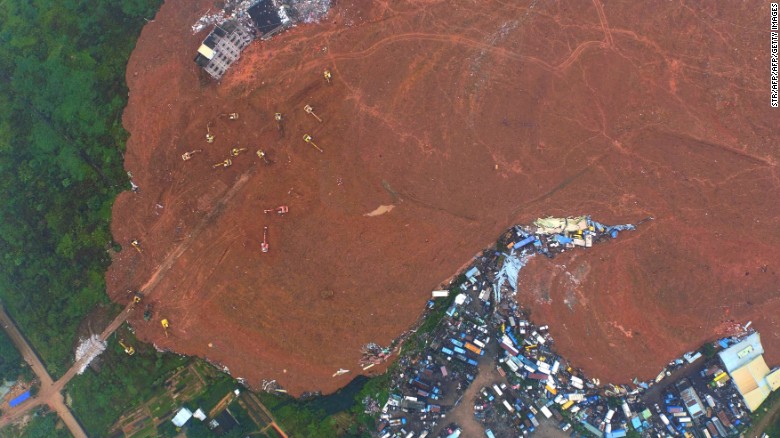Shenzhen, China – The parents of 6-year-old Hong Laibao were delivering goods at an industrial park in the southern Chinese city of Shenzhen when a mountain of construction waste collapsed, engulfing factory buildings and homes.
“I want my mum and my dad to come out faster,” he said, wiping tears from his eyes as he spoke to CNN from a local sports stadium being used as temporary shelter alongside his elder brother and aunt.
So far, they’re nowhere to be found.
A massive rescue effort involving 4,000 people has been underway since Sunday’s landslide, but the likelihood of finding people still alive is small, state broadcaster CCTV said Tuesday.
Still, state-run China National Radio reported early Wednesday that two survivors, including a 19-year-old man from Chongqing municipality, were rescued in the early morning hours.
There also was grim news, as the first victim’s body was pulled from the red mud and rubble, according to a televised news conference given by Shenzhen’s local government.
State-run news agency Xinhua later reported a second body was found, while CCTV said three people had died. It was unclear if the third death was that of one of the survivors mentioned in other reporting.
There are as many as 76 more people reported missing, according to CNN’s calculations based on Chinese media reports.
CNN footage showed dozens of excavators working to clear the rubble, dwarfed by the sheer scale of the landslide, which covered 380,000 square meters (94 acres) — or around 60 football fields.
Densely packed with few air pockets, in some places the mud and debris was piled four stories tall, CCTV reported. The landslide toppled buildings and ruptured a gas pipeline, so clearing the site could take weeks, it added.
Meanwhile, little Hong’s elder brother described how he called his father repeatedly, until his cell phone battery went flat.
“When are they going to find our parents? In our culture, no matter what happened to them, we need to see them, even if it’s their remains,” said Hong Xianlin.
At least 16 people remain hospitalized, three in a serious condition, according to Shenzhen’s emergency response office.

What caused the collapse?
What exactly caused the landslide isn’t clear.
The company in charge of the waste dump’s construction purportedly raised safety concerns in a January report filed with the municipal government, according to the state-run Legal Evening News.
About one million square meters (247 acres) of soil waste is left every year in Guangming New District and there’s need to find its way out. Therefore it is needed urgently to build new waste dumps,” the report read, according to Legal Evening News.
The report also raised the issue of soil erosion, as the dump used to be a quarry, the newspaper said.
“The area used to be a rock field, the rocks were all dug out, which created a hollow pond, so they filled the pond with mud waste, all kinds of mud waste, which turned into a giant mountain,” Liu Huizhen, Hong’s aunt, told CNN.
Residents had also repeatedly complained about noise and dust coming from the waste dump, local media reported.
Locals told Xinhua that hundreds of trucks carrying construction waste used to dump trash into the pile every day.
A security guard working in a factory in the area told Xinhua that a 250-yuan ($38) fee was charged per truck.
Migrant workers
Authorities said it was hard to calculate the exact number of missing because many of the people living and working there are thought to be migrant workers from China’s poorer, inland provinces, who are often unregistered or their relatives so far away to be contacted quickly.
Hong’s parents were from the northern province of Henan and had been living in Shenzhen for 10 years.
The city, just a short drive from the international financial center of Hong Kong, is regarded as the birthplace of China’s economic miracle but the disaster, which came four months after massive and chemical blasts killed almost 200 people in the northern city of Tianjin, shows the costs of the country’s rapid industrial transformation.
Little Hong visited the landslide Monday, with his aunt and elder brother, but refused to leave the site when it was time to go.
“He simply wouldn’t leave, and said that he’d regret it if leaves. He says he doesn’t want (to leave) even if all the money in the world is given to him, he only wants his parents,” said Liu, his aunt.
“These boys are going to be orphaned, with no one to take care of them,” she added.
As reported by CNN
